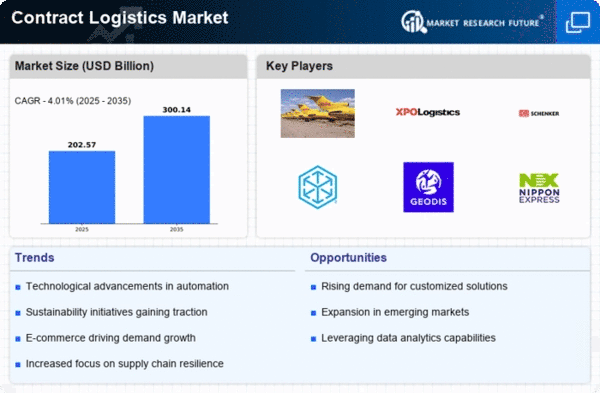Market Trends
Key Emerging Trends in the Contract Logistics Market
The contract logistics market is undergoing transformational changes, reflecting the increasingly global and rapidly moving supply chain requirements of businesses. The growing e-commerce industry is a prime driver of contract management, and Businesses seek efficient and flexible solutions to manage the complexities of online shopping. Omnichannel logistics, which seamlessly integrates online and offline channels, is becoming increasingly essential, driving demand for contract logistics offerings that can supply included and agile supply chain answers. Contract vendors are adopting generation and automation to increase efficiency and accuracy in warehouse operations. Robots, synthetic intelligence, and advanced warehouse control systems are being used to improve order fulfillment, reduce lead times, and decrease cargo mistakes. Sustainability has become a prime consideration in agreement logistics, driven both by regulatory requirements and expanded environmental awareness amongst companies and customers. Businesses are searching out more custom-designed logistics answers to meet their requirement and gain a competitive advantage. Contract logistics carriers offer cost-brought offerings, which include packaging, labeling, kitting, and product customization to satisfy the specific requirements of various organizations. Last-mile delivery has emerged as a chief cognizance in settlement logistics, mainly with the upward push of e-trade and customer expectations for instant and reliable transport; settlement providers are expanding their last-mile abilities to provide customers with well-timed, fee-powerful crowning glory. And while they may be affected, they use technology and strategic partnerships to make sure delivery. The global nature of the supply chain leads firms to prioritize flexibility in their exports. Acceptance of data analytics in contract management is increasing, providing business insights for predictive decision-making. Big data analytics and predictive modeling help optimize inventory management, demand forecasting, and overall supply visibility, positively enabling informed logistics decision-making. The recent experience of global disturbances such as the COVID-19 pandemic has highlighted the need for robust risk management strategies in the logistics sector. Increasing regulatory requirements and complex international trade are affecting contract logistics arrangements. Suppliers are aware that regulations, customs procedures, and trade agreements are being changed to ensure smooth cross-border movement and compliance with global trading standards.


















Leave a Comment